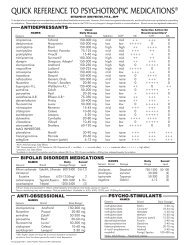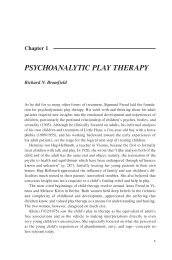IRAQ WAR CLINICIAN GUIDE
Iraq War Clinician's Guide - Network Of Care
Iraq War Clinician's Guide - Network Of Care
Create successful ePaper yourself
Turn your PDF publications into a flip-book with our unique Google optimized e-Paper software.
Iraq War Clinician Guide 110 Appendix D<br />
Relevant History<br />
Exposure to potentially traumatic events. Because exposure to previous traumatic stressors may<br />
affect response to traumatic stressors experienced in the military, it is important to broadly assess<br />
exposure to traumatic stressors. The Trauma History Screen (Carlson, 2002), a brief assessment<br />
tool that can be used for that purpose, is included in this appendix.<br />
Selected scales within the Deployment Risk and Resilience lnventory (DRRI; King, King, & Vogt,<br />
2003) may be used as a vehicle to identify particular combat and other high magnitude and<br />
threatening experiences that were potentially traumatic. Because the level of non-traumatic<br />
stressors and the overall context in which exposure to traumatic stressors occurs may affect the<br />
response to high magnitude stressors, it is important to assess these elements. Several scales from<br />
the DRRI (e.g., concerns about life and family disruptions, difficult living and working<br />
environment, war-zone social support) may prove useful to gain a broader profile of the<br />
deployment experience. Copies of the individual DRRI measures, scoring guides, and a full<br />
manual describing instrument development may be obtained by contacting<br />
dawne.vogt@nied.va.~,<br />
For women veterans. Because women who serve in the military may be exposed to a number of<br />
traumatic stressors that are not assessed in combat measures, specific assessment of military<br />
stressors is often helpful for women veterans. Life Stressors Checklist (Wolfe & Kimerling, 1997) is<br />
provided in this appendix for this purpose.<br />
References<br />
Beck, A.T., & Steer, R.A. (2000). Beck Depression Inventory. In Task Force for the Handbook of Psychiatric<br />
Measures (Ed.), Handbook ofpsychiatric measures (pp. 519-522). Washington, DC: American<br />
Psychiatric Association.<br />
Briere, J. (1997). Psychologicalassessment ofadult posttraumatic states. Washington, DC: American<br />
Psychological Association.<br />
Bryant, R.A., & Harvey, A.G. (2002). Acute Stress Disorder: A synthesis and critique. Psychological Bulletin,<br />
128, 886-902.<br />
Carlson, E.B. (1997). Trauma assessments: A clinician's guide. New York: Guilford Press.<br />
Carlson, E.B. (November, 2002). Challenges to assessing traumatic stress histories in complex trauma<br />
survivors. Paper presented at the Annual meeting of the lnternational Society for Traumatic Stress <br />
Studies, Baltimore, MD. <br />
Carlson, E.B., & Waelde, L. (November, 2000). Preliminary psychometric properties of the Trauma Related<br />
Dissociation Scale. Paper presented at the Annual meeting of the International Society for Traumatic<br />
Stress Studies, San Antonio, TX.<br />
Goldman, M., Brown, S., & Christiansen, B. (2000). Alcohol Expectancy Questionnaire (AEQ). In Task Force<br />
for the Handbook of Psychiatric Measures (Ed.), Handbook ofpsychiatric measures (pp. 476-477).<br />
Washington, DC: American Psychiatric Association.<br />
King, D.W., King, L.A., & Vogt, D.S. (2003). Manual for the Deployment Risk and Resilience lnventory<br />
(DRRI): A collection of measures for studying deployment-related experiences in military veterans.<br />
Boston, MA: National Center for PTSD.<br />
Kubany, E.S., Abueg, F.R., Owens, J.A., Brennan, J.M.,Kaplan, A.S., &Watson, S.B. (1995). Initial<br />
examination of a multidimensional niodel of trauma-related guilt: Applications to combat veterans and<br />
battered women. Journal of Psychopathology and Behavioral Assessment, 17,353-376.<br />
DEPARTMENT OF VETERANS AFFAIRS<br />
NATIONAL CENTER FOR PTSD




